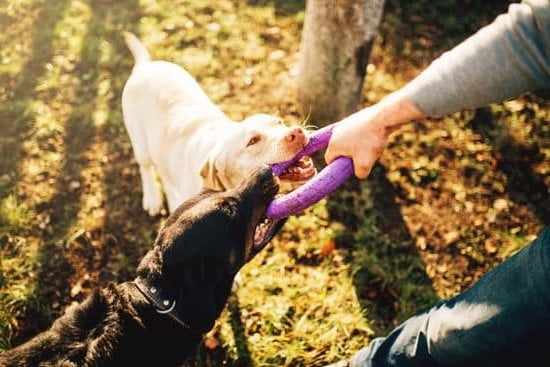Are you passionate about working with dogs and helping them reach their full potential? If so, becoming a qualified K9 dog trainer could be the perfect career path for you. In this article, we will guide you on how to become a successful K9 dog trainer, from understanding the role to gaining experience and building a reputable portfolio.
K9 dog training goes beyond teaching basic commands; it involves shaping behavior, enhancing obedience, and strengthening the bond between dogs and their handlers. As a K9 dog trainer, you have the opportunity to make a positive impact on both dogs and their owners, creating well-behaved canine companions.
To succeed in K9 dog training, one must possess certain qualities such as patience, compassion, excellent communication skills, and a deep understanding of canine behavior. In addition to these traits, specific skills like problem-solving, adaptability, and the ability to work well under pressure are essential for effectively training dogs in various environments and situations.
Understanding the Role of a K9 Dog Trainer
As a K9 dog trainer, your role is not just limited to teaching basic commands or obedience to dogs. You are responsible for shaping and developing the behavior of these animals, often with specific purposes in mind such as search and rescue, drug detection, or therapy work.
It requires a deep understanding of canine behavior, psychology, and learning principles. Beyond the training aspect, you also need to have excellent observational skills to assess each dog’s progress and adjust training methods accordingly.
One crucial aspect of being a successful K9 dog trainer is the ability to communicate effectively not only with the dogs but also with their owners. You will be working closely with both parties to ensure that the training goals are understood and met. Patience, empathy, and clear communication are key traits that can help you build trust with both dogs and their human companions.
To become a qualified K9 dog trainer, it is essential to educate yourself on various training methods and techniques that are effective for different breeds and temperaments. This can involve formal education through courses or workshops specifically geared towards K9 training. Additionally, gaining hands-on experience through internships or apprenticeships with experienced trainers can provide valuable insights into the practical aspects of working with dogs in various settings.
| Key Skills | Importance |
|---|---|
| Communication | Effective communication is vital for conveying instructions to both dogs and their owners. |
| Patience | Dogs vary in learning speed, requiring patience to work through challenges. |
| Observational Skills | The ability to assess behaviors accurately allows for timely adjustments in training methods. |
Qualities and Skills Needed to Succeed in K9 Dog Training
Understanding K9 Behavior and Psychology
To become a qualified K9 dog trainer, it is essential to have a deep understanding of canine behavior and psychology. Dogs communicate through body language, vocalizations, and actions, and a trainer must be able to interpret these signals accurately. Understanding how dogs think and learn is crucial in developing effective training methods that are both humane and successful. By studying canine behavior, trainers can tailor their approach to each individual dog’s needs, making the training process more efficient.
Patience and Consistency
Two key qualities needed to succeed as a K9 dog trainer are patience and consistency. Training a dog takes time, repetition, and perseverance. Dogs may not always respond immediately to commands or behaviors that are being taught, so patience is paramount.
Consistency in training methods and expectations helps dogs understand what is expected of them and reduces confusion. A patient and consistent approach not only builds trust between the trainer and the dog but also leads to better results in the long run.
Effective Communication Skills
In addition to understanding canine behavior, successful K9 dog trainers need to possess excellent communication skills. Clear communication with both the dog and their human companions is essential for delivering instructions, providing feedback, and addressing any concerns or questions. Trainers must be able to convey information effectively, whether through verbal cues, hand signals, or body language. Strong communication skills help create a positive learning environment for both the dog and the owner, fostering successful training outcomes.
By honing these qualities and skills along with acquiring proper education, training, certification, experience, building a portfolio, marketing oneself effectively as a K9 dog trainer can lead to a fulfilling career helping dogs reach their full potential while strengthening the bond between them and their human companions.
Education and Training Requirements for K9 Dog Trainers
To become a qualified K9 dog trainer, it is essential to understand the education and training requirements needed to excel in this field. While some may have a natural affinity for working with dogs, formal education and training can significantly enhance your skills and credibility as a professional K9 dog trainer.
Here are some education and training requirements that aspiring K9 dog trainers should consider:
- Complete High School Education: A high school diploma or GED is typically the minimum educational requirement for pursuing a career as a K9 dog trainer.
- Enroll in a Dog Training Program: Consider enrolling in a reputable dog training program or school that offers courses specifically focused on K9 training techniques and methods.
- Gain Hands-On Experience: Seek opportunities to gain hands-on experience working with dogs, whether through internships, volunteer work at animal shelters, or apprenticeships with experienced K9 trainers.
Moreover, obtaining certification from recognized organizations such as the Certification Council for Professional Dog Trainers (CCPDT) or the International Association of Canine Professionals (IACP) can further validate your expertise and knowledge in the field of K9 dog training. These certifications demonstrate your commitment to maintaining high standards of professionalism and ethics within the industry. By investing in your education and training, you can lay a solid foundation for a successful career as a qualified K9 dog trainer.
Certification and Licensing for K9 Dog Trainers
Obtaining Certification
Becoming a certified K9 dog trainer is essential in establishing credibility and trust with clients. There are several organizations that offer certification programs for aspiring dog trainers, such as the Certification Council for Professional Dog Trainers (CCPDT) and the International Association of Canine Professionals (IACP).
These organizations provide comprehensive training programs that cover topics such as canine behavior, training techniques, and ethical standards. By completing a certification program, you will demonstrate to potential clients that you have the knowledge and skills necessary to train their furry companions effectively.
Licensing Requirements
In addition to obtaining certification, some states may require dog trainers to obtain a license before practicing professionally. Licensing requirements vary by state, so it is important to research the specific regulations in your area.
To become a licensed K9 dog trainer, you may need to pass an exam, provide proof of education or experience, and pay a licensing fee. By meeting these requirements, you will ensure that you are legally allowed to work as a professional dog trainer in your state.
Maintaining Certification and Licensing
Once you have obtained certification and licensing as a K9 dog trainer, it is important to maintain these credentials through continuing education and professional development. Many certification programs require trainers to complete a certain number of continuing education credits every few years to renew their certification.
Similarly, licensed trainers may need to periodically renew their licenses by fulfilling specific requirements set by their state regulatory board. By staying up-to-date on the latest training techniques and industry trends, you will continue to grow as a qualified K9 dog trainer and provide the best possible service to your clients.
Gaining Experience in K9 Dog Training
When it comes to becoming a qualified K9 dog trainer, gaining hands-on experience is essential. This experience allows you to put into practice the knowledge and skills you have acquired through education and training. There are several ways to gain experience in K9 dog training:
- Apprenticeship: One of the most effective ways to gain experience is by apprenticing under an experienced K9 dog trainer. This mentorship allows you to learn directly from someone who has been working in the field for years.
- Volunteering: Another great way to gain experience is by volunteering at shelters, rescue organizations, or training facilities that work with K9 dogs. This allows you to work with a variety of dogs and gain valuable experience in different training methods.
- Internship: Some organizations offer internship programs for aspiring K9 dog trainers. These programs provide hands-on training under the supervision of experienced professionals and may lead to employment opportunities.
By gaining practical experience in working with K9 dogs, you will develop your skills, build confidence, and learn how to handle different types of dogs effectively. This hands-on experience is invaluable in preparing you for a successful career as a qualified K9 dog trainer.
Remember that every interaction with a dog is an opportunity to learn and grow as a trainer. Whether working with challenging behaviors or teaching basic obedience commands, each experience adds to your expertise and helps you become a more well-rounded professional. Keep seeking opportunities to work with dogs and continue building your knowledge and skills on your journey to becoming a qualified K9 dog trainer.
Building a Portfolio and Establishing Reputation as a K9 Dog Trainer
To become a qualified K9 dog trainer, building a portfolio and establishing a reputation in the industry is essential. A strong portfolio showcases your experience, expertise, and success stories in training dogs. This will not only attract potential clients but also demonstrate your skills to prospective employers or partners.
One effective way to build a portfolio is by taking on various training projects with different breeds and behavioral issues. Documenting the progress of each dog you train, including before-and-after photos or videos, can help showcase your abilities as a K9 dog trainer.
Networking within the dog training community is another crucial step in establishing your reputation as a qualified K9 dog trainer. Attending workshops, seminars, and conferences related to dog training can provide valuable opportunities to learn from other professionals in the field.
Building relationships with established trainers can open doors for mentorship or collaboration, helping you gain further experience and credibility in the industry. Additionally, volunteering at animal shelters or rescue organizations can not only contribute to your portfolio but also demonstrate your commitment to helping dogs in need.
In addition to hands-on experience and networking, utilizing online platforms can help you establish an online presence as a K9 dog trainer. Creating a professional website or social media profiles dedicated to your services can make it easier for potential clients to find you.
Sharing valuable content related to dog training, posting testimonials from satisfied clients, and showcasing any certifications or licenses you have obtained are all ways to build trust and credibility with your target audience. Consistent branding and marketing efforts will contribute to establishing yourself as a reputable and qualified K9 dog trainer in the competitive pet industry.
| Benefit | Method |
|---|---|
| Showcase expertise | Document progress of each trained dog |
| Build relationships | Network within the industry & volunteer at shelters |
| Create online presence | Utilize websites & social media for marketing efforts |
Marketing Yourself as a Qualified K9 Dog Trainer
As a qualified K9 dog trainer, marketing yourself is crucial to attracting clients and establishing your reputation in the industry. One of the most effective ways to market yourself as a K9 dog trainer is by showcasing your expertise and experience.
You can do this by creating a professional website that highlights your background, training methods, and successful case studies. Having a strong online presence not only helps potential clients find you but also allows you to share valuable content related to K9 dog training, demonstrating your knowledge and skills.
In addition to having a professional website, utilizing social media platforms can also help you reach a wider audience and connect with potential clients. By regularly posting engaging content such as training tips, client testimonials, and before-and-after videos of successful training sessions, you can showcase your capabilities as a K9 dog trainer. Engaging with followers by answering their questions and participating in online conversations about dog training can further establish your credibility in the field.
Networking within the K9 dog training community is another essential aspect of marketing yourself as a qualified professional. Attending industry events, workshops, and conferences allows you to connect with other trainers, share best practices, and learn about the latest trends in K9 dog training.
Building relationships with colleagues not only provides opportunities for collaboration but also referrals for potential clients who may be seeking specialized services. By actively engaging in networking activities, you can position yourself as a knowledgeable and trustworthy K9 dog trainer within the industry.
Continuing Education and Professional Development in K9 Dog Training
Becoming a qualified K9 dog trainer is not just about getting your initial education and certification. It is an ongoing process that requires dedication to continuously improve your skills and knowledge in the field. One of the best ways to stay ahead in the world of K9 dog training is through continuing education and professional development.
There are various ways you can continue your education as a K9 dog trainer. Attending seminars, workshops, and conferences focused on canine behavior and training can provide you with valuable insights and updates on the latest techniques and tools in the industry. Online courses and webinars are also great resources for expanding your knowledge from the comfort of your own home.
Professional development opportunities such as mentorship programs or working under experienced trainers can offer hands-on experience that complements your theoretical knowledge. Furthermore, staying current with industry trends through reading books, journals, and research articles can help you enhance your skills as a K9 dog trainer. By committing to lifelong learning, you can build a successful career as a qualified K9 dog trainer while providing the best possible care for your furry clients.
Conclusion
In conclusion, becoming a qualified K9 dog trainer is a rewarding career path for individuals passionate about working with animals and making a positive impact on their lives. By following the steps outlined in this article, aspiring trainers can pave their way to success in the field of K9 dog training.
To become a qualified K9 dog trainer, it is essential to possess a combination of knowledge, skills, experience, and certification. Understanding the role of a K9 dog trainer, having a genuine love for dogs, and being patient and compassionate are key qualities needed to excel in this profession.
Additionally, completing the necessary education and training programs, obtaining relevant certifications, and gaining hands-on experience through apprenticeships or internships are crucial steps in building a strong foundation as a professional K9 dog trainer.
Continuous learning and professional development play an important role in staying up-to-date with the latest training techniques and methodologies in the field of K9 dog training. By investing in ongoing education and expanding one’s skills repertoire, qualified trainers can further enhance their expertise and reputation within the industry. Overall, embarking on the journey to become a qualified K9 dog trainer requires dedication, hard work, and a genuine passion for helping dogs reach their full potential.
Frequently Asked Questions
How Many Years Does It Take to Train a K9?
The duration it takes to train a K9 usually ranges from 6 months to 1 year, depending on the specific tasks they are being trained for. Building a strong bond and mastering commands take time.
What Is the Highest Rated Dog Training Certification?
The highest-rated dog training certification is often considered the Certified Professional Dog Trainer – Knowledge Assessed (CPDT-KA) credential. This certification requires passing a comprehensive exam covering various aspects of dog training and behavior.
Is It Hard to Train K9?
Training a K9 can be challenging due to the rigorous standards and specialized skills required for tasks like detection, protection, or search and rescue. It demands patience, consistency, and dedication from both the trainer and the K9 partner.

Welcome to the blog! I am a professional dog trainer and have been working with dogs for many years. In this blog, I will be discussing various topics related to dog training, including tips, tricks, and advice. I hope you find this information helpful and informative. Thanks for reading!





